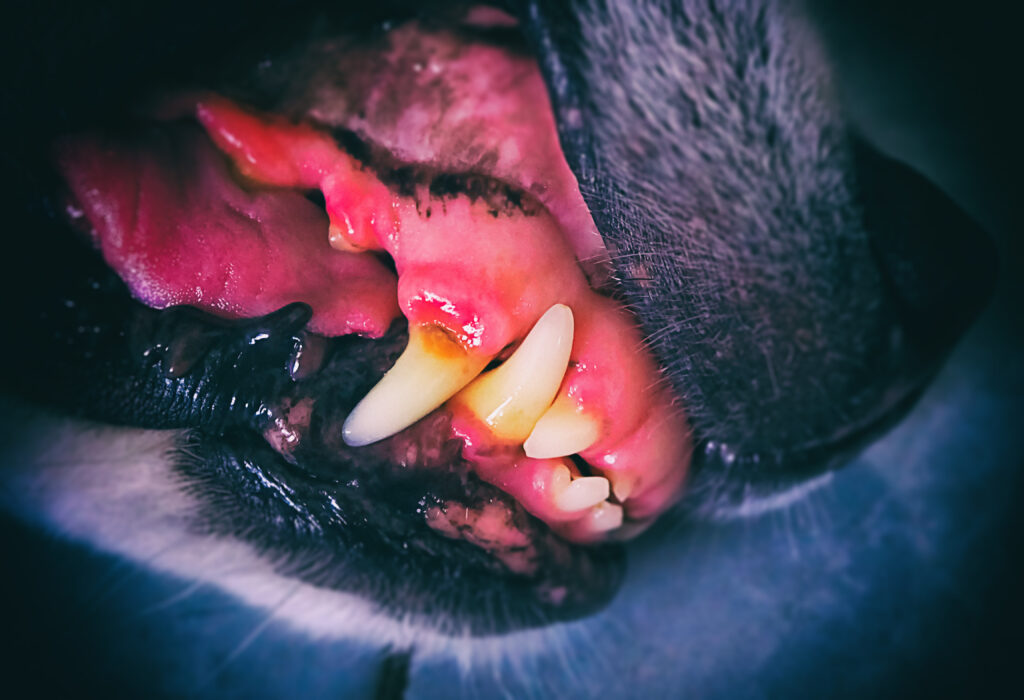When it comes to keeping your dog healthy and happy, understanding the risks and prevention of gum disease is key. Gum disease in dogs, also known as periodontal disease, is a common issue that can affect your pet’s mouth, teeth, and overall health. This article will explain what gum disease is, how it affects your pet, and ways to prevent it. For more detailed information or to book an appointment, the team at North Jersey Animal Hospital in Wayne, NJ, is here to help. Give us a call at (973) 595-8600, and let’s ensure your dog’s mouth stays healthy!
What Causes Gum Disease in Dogs?
Gum disease in dogs is more than just a problem with their teeth. It starts with the buildup of plaque, a sticky film containing bacteria. If it’s not removed, plaque can harden into tartar, which is impossible to clean off without professional care. Tartar buildup can lead to inflammation of the gums, a condition known as gingivitis. If left untreated, this can progress to periodontal disease, affecting the deeper structures of the tooth and leading to tooth loss, infections, and even more serious health problems.
Signs of Gum Disease
The signs of gum disease in dogs can be hard to spot unless you know what to look for:
- Bad breath: One of the first signs you might notice is unusually bad breath, which is caused by bacteria in your dog’s mouth.
- Red or swollen gums: Inflammation of the gums is a clear sign of gum disease. The gums may appear more red than usual and may be swollen, too.
- Bleeding gums: If you notice bleeding during brushing or even spontaneously, it’s a sign that gum disease may be present.
- Difficulty eating: Dogs with gum disease might have trouble chewing their food or show less interest in eating, especially if it causes them pain.
- Loose teeth: Advanced gum disease can lead to loosening of the teeth due to damage to the supporting structures.
- Pawing at the mouth or face: Dogs may paw at their mouths if they’re experiencing discomfort or pain due to gum disease.
- Receding gums: You might notice that the gums have pulled back from the teeth, exposing more of the tooth than is normal.
How to Prevent Gum Disease in Dogs
Preventing gum disease in dogs is all about good dental care. Brushing your dog’s teeth regularly is the best way to remove plaque and prevent tartar build-up. Special dog toothbrushes and toothpaste are available to make this task easier and safer. Besides brushing, dental chews and toys can help reduce plaque. Ask your veterinarian for recommendations to ensure the best care for your pet’s needs.
Regular pet dental exams with your vet are also important. These appointments provide an opportunity to catch signs of gum disease early, making treatment more effective. Our team at North Jersey Animal Hospital is skilled in providing dental care for dogs and can guide you on how to best care for your dog’s teeth at home.
How Diet Affects Gum Disease
What your dog eats has a direct effect on their dental health. Certain foods can hasten the formation of plaque, while others are formulated to help reduce plaque buildup and strengthen your dog’s teeth and gums. Wet food has the benefit of added hydration for your pet, but it can also cause more plaque buildup. Dry kibble is often recommended because its texture can help clean the teeth. There are also special dental diets formulated to reduce tartar buildup. Always choose high-quality food for your dog, and feel free to ask our team for recommendations tailored to your dog’s needs.
Professional Dental Cleanings
Sometimes, despite our best efforts, our dogs can still develop gum disease. This is where professional dental cleanings come in. These cleanings, performed under anesthesia, allow your vet to thoroughly clean your dog’s teeth, both above and below the gumline. This process removes plaque and tartar buildup you can’t remove yourself at home. Professional cleanings can significantly reduce the risk of advanced gum disease and are a critical part of your dog’s dental care routine.
How North Jersey Animal Hospital Can Help
At North Jersey Animal Hospital, we’re committed to helping you keep your dog’s mouth healthy. From routine oral exams to thorough teeth cleanings, our team is here to support you and your pet throughout their lifetime. We understand the importance of dental health and are equipped to provide the care your dog needs to prevent and treat gum disease.
If you’re concerned about gum disease in your dog or just want to get ahead with preventative care, give us a call at (973) 595-8600. Our friendly staff at North Jersey Animal Hospital in Wayne, NJ, is ready to provide you with more information and help you schedule an appointment.





